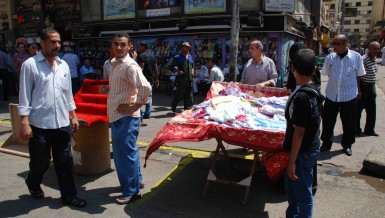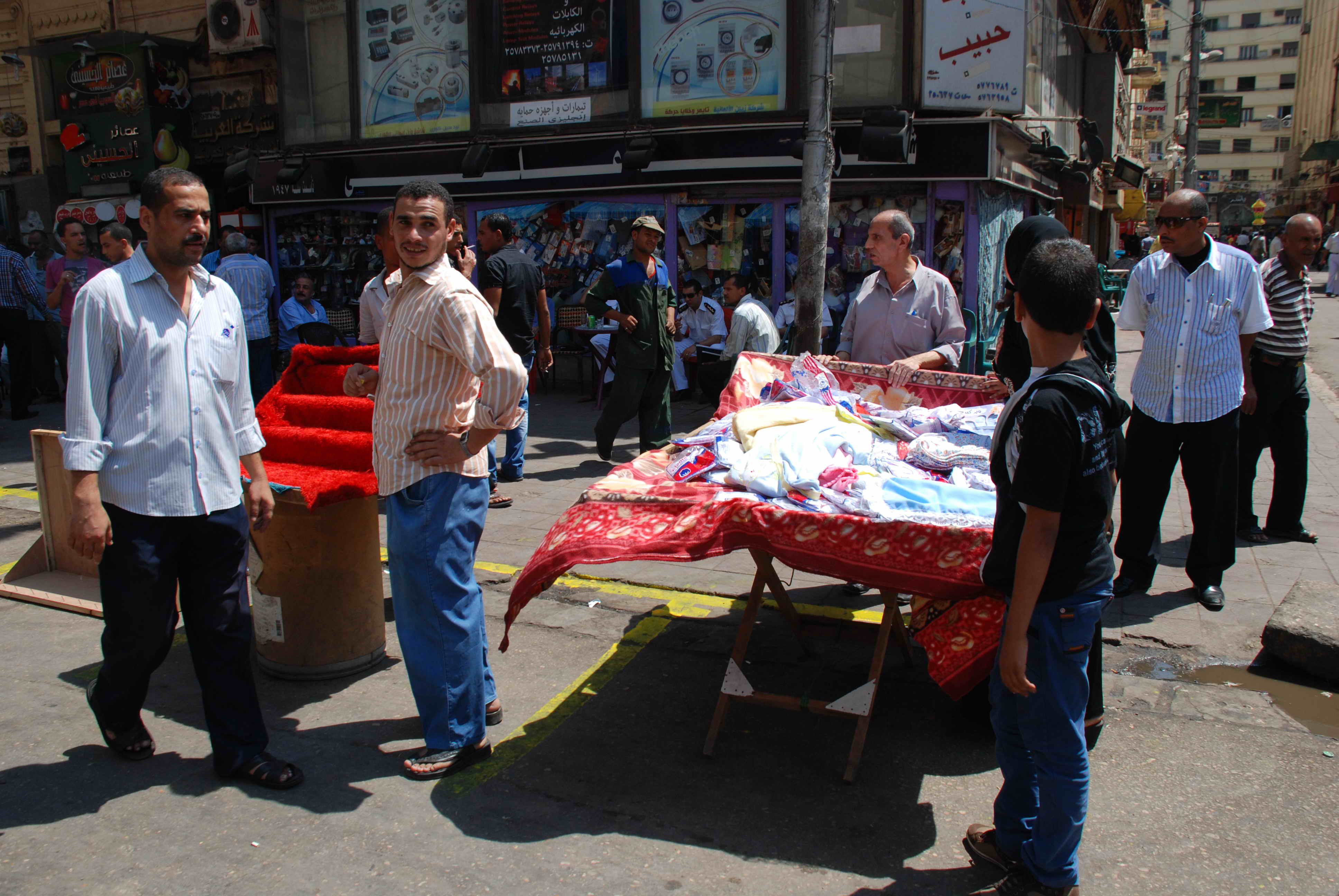
(Photo by: Mohamed Omar)
By Anaam Al-Adawi
A recent announcement by the Cairo Governorate to construct new market places to accommodate the city’s unlicensed street vendors was met with shock and concern by businessmen and store owners. The new plan is estimated to accommodate only 10% of the city’s unlicensed street vendors, and would take nearly one year to implement.
Businesses throughout Cairo first demanded that the Governorate cooperate with other government institutions to address prolonged security lapses and use all means at their disposal to put an end to the perceived crisis of unlicensed street vendors. They claimed that the surge in these unlicensed traders seen since the 2011 revolution threatened the viability of legitimate businesses.
Businessmen in the city pledged their support for the Governorate’s plan on the condition of improvements in the security situation, particularly in Downtown districts such as Talaat Harb, Al-Tawfikia, Al-Azbakiya and Ramses. There were also calls for vendors traveling from other regions, particularly in Upper Egypt, be forced to return to their home provinces.
Muhammad Gharib, Deputy President of the Chamber, said that vendors will not willingly leave their current locations unless provided with viable alternatives from where they can continue to trade. He also said that any areas created by officials that do not address the needs of vendors will be quickly abandoned.
Salih Al-Abd, a member of the Board of Directors for the Cairo Chamber of Commerce, welcomed the financial contributions of local businessmen to help establish licensed market areas, ensuring that unlicensed vendors would not be allowed to return to their previous locations. He further acknowledged that many vendors rent their locations from other store or property owners, sometimes at a rate of EGP 300,000 per year.
Atif Al-Ashmuni, Secretary to the Cairo Chamber of Commerce, said that statistics produced by the Governorate about the number of street vendors operating throughout the city, estimated at 20,000, were inaccurate. He said that in reality the numbers were closer to 200,000. Al-Ashmuni also alleged that some vendors brought weapons with them in order to ensure that store owners allow them to operate freely.
Al-Ashmuni expressed his frustration over the short-sighted nature of the plan, in addition to the fact that implementation will take between 10 to 12 months, saying: “There should not be a two month discrepancy as to when the plan will be implemented, especially considering the fact that such a plan only addresses the needs of 2,000 of the city’s unlicensed vendors”.
Al-Ashmuni discussed the need to exploit land resources that are currently under-utilised, citing Taha Qandil Street in Al-Matariyyah neighbourhood where a market was recently constructed using EGP 100m in funding from the Ministry of Endowments. All storefronts in this new marketplace are state owned he added.
Desouky Sayid Desouky, President of the Spare Parts Division of the Cairo Chamber of Commerce, said that none of the city’s unlicensed vendors pay taxes or utility bills in the areas where they operate. He said this reality will have to be taken into account when attempting to provide successful alternatives.
Ahmed Yahiya, President of the Food Resources Division in the Cairo Chamber of Commerce, said that a study should be conducted looking into the demands of street vendors before any attempts to construct alternative markets are undertaken.
Abdel Aziz Al-Sayyid, President of the Poultry Division at the Cairo Chamber of Commerce, said that the Governorate’s current plan only provides accommodation for 10% of the city’s 20,000 unlicensed vendors. He said that any plan hoping to address the full extent of the situation should accommodate at least 40% to 50% of the city’s unlicensed vendors.
Reda Hosni, an official working with the Cairo Governorate, said that the limited number of places provided for by the plan was due to a shortage of funding. She added that the Governorate hoped to cooperate with the Cairo Chamber of Commerce and other governing institutions in order to better address the needs of all of the city’s unlicensed vendors.
Hosni added that suggestions made by businessmen and store owners would soon be brought before the Governorate, highlighting the financial contributions made by the businessmen to help fund the project which would, as she described, help restore Egypt back to its former glory. Hosni went on to say that the Governorate had already begun to create a strategy for unlicensed traders before the 2011 revolution, but that problems had become worse with the subsequent breakdown in policing.




